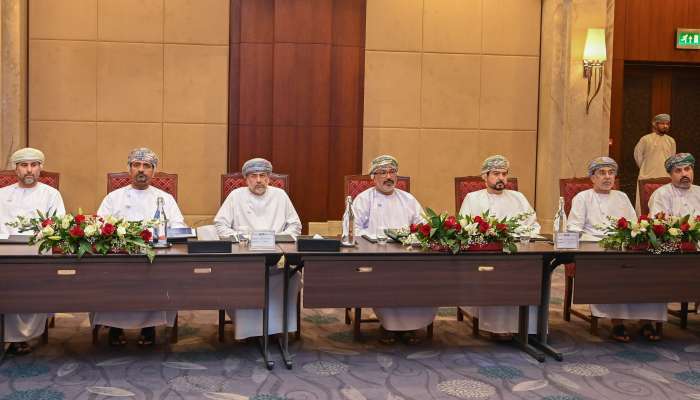
Muscat: The Ministry of Commerce, Industry and Investment Promotion has officially adopted the outcomes of the "Resolving Business Challenges in Oman" forum, marking a strategic shift from dialogue to implementation in addressing financing challenges for economic diversification sectors.
The decision follows extensive discussions involving ministers, undersecretaries, representatives from government and private entities, and experts from the banking and investment sectors.
Ibtisam Ahmed Al Furooji, Undersecretary of the Ministry of Commerce, Industry and Investment Promotion for Investment Promotion, stated that the meeting represents a transition from discussion to practical implementation, building upon ideas crystallised during the workshop held last February.
In her address, she emphasised that the Ministry was keen to involve various government and private entities, believing that the success of the business environment requires integrated work among all parties. She indicated that adopting the outcomes reflects Oman's commitment to accelerating economic reforms and simplifying procedures, in line with the objectives of Oman Vision 2040. She stressed that tangible results will be measured through precise performance indicators and systematic follow-up plans.
The Ministry of Commerce, Industry and Investment Promotion had previously organised a national workshop from 26 January to 2 February 2025, to address business challenges in Oman, focusing on five main pillars: Commercial and Investment Companies and Free Zones, Employment, Legislation and Judiciary, Tenders, and Finance and Taxes. For each pillar, drivers for change, responsible entities, and a clear action plan were identified, all linked to the goals of Oman Vision 2040.
Regarding the first pillar on Commercial and Investment Companies and Free Zones, Tahra Sultan Al Amri, Director of the Business Environment Facilitation and Development Department and a member of the Digital Transformation Team at the Ministry, presented a comprehensive overview. She addressed challenges in the investor journey, such as ambiguous legal texts in some legislation, the multiplicity of licensing authorities, and lack of integration between e-systems.
For the second pillar on Employment, Ammar Salim Al Saadi, Director General of Labour at the Ministry of Labour, reviewed the Ministry's efforts to align the labour law with market requirements, facilitate permit and visa systems, and enhance Omanisation programmes. He highlighted the importance of introducing flexible work permit systems based on the nature of the activity and providing an accurate database through the "Tawteen" platform to ensure a balance between attracting foreign expertise and developing national capabilities.
In the third pillar, Legislation and Judiciary, Judge Saif Abdullah Al Hosni, Assistant Secretary-General for Court Affairs and Clerk at the Supreme Judiciary Council, explained that developing specialised commercial judiciary and activating alternative dispute resolution methods like arbitration and mediation have become necessary to expedite the resolution of investment cases. He also focused on the project for visual electronic trials and developing the judicial enforcement system to ensure the swift and efficient delivery of rights to their owners.
For the fourth pillar on Tenders, Eng. Said Hamad Al Amri, Director General of Tenders at the Projects and Tenders and Local Content Authority, outlined the main challenges facing the tender process, particularly concerning timelines, bid bonds, and performance guarantees.
Regarding the fifth pillar on Finance and Taxes, Rashad Ali Al Mosafir, founder of Al Afaq Financial (a knowledge house), presented a specialised study on the reality of business financing in Oman. The study revealed the most prominent challenges facing SMEs, such as high bank interest rates, requirements for substantial guarantees, and limited long-term financing. The study recommended creating credit guarantee programs and providing accessible financial liquidity for productive sectors.
On the role of the banking system, Dr. Yousuf Hamad Al Balushi, an economic expert and founder of the Smart Investment Gateway, gave a presentation titled "The Banking System and its Role in Economic Transformations." He confirmed that financing is the biggest challenge for doing business, calling for the establishment of a national loan guarantee institution, expanding financing alternatives, attracting international investment banks, and developing digital solutions to reduce financing gaps.
Meanwhile, Eng. Said Khalifa Al Hatmi, Director of the National Programme for Financial Sustainability and Financial Sector Development Office at the Ministry of Finance, spoke about the government's efforts to diversify financing instruments such as sukuk, bonds, and investment funds.
Sayyid Waqas Al-Arqam Al Busaidi, Supervisor of the Quality Control Team for the workshop from Oman Vision 2040 Follow-up Unit, presented on governance and implementation mechanisms, stressing the importance of accurate performance indicators and forming joint follow-up teams to ensure the practical application of initiatives.
The workshop concluded with a discussion session, during which the participants emphasized that the success of economic diversification plans requires an integrated partnership between the government, the private sector, and banks, with a priority given to empowering small and medium enterprises.
The Ministry of Commerce, Industry and Investment Promotion confirmed that adopting the outcomes of the business resolution workshop and discussing financing challenges are pivotal steps to enhancing Oman's economic competitiveness and supporting its position as an investment destination capable of attracting capital and achieving the goals of Oman Vision 2040.